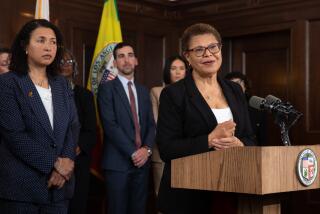An L.A. budget, with flaws
There is a bit to cheer in the proposed budget that the City Council could take up as early as Friday. An uptick in property tax revenue provided a badly needed bit of room to maneuver. Cutbacks in services that might have led to the elimination of 600 jobs now may end up claiming about two-thirds as many. A modest increase to the city’s reserve fund may also be possible. Those are the results of a thoughtful and meticulous process engaged in by the council’s new Budget and Finance chair, Councilman Paul Krekorian.
That said, there is much not to like. For years, Mayor Antonio Villaraigosa has been promising to face squarely the city’s so-called structural deficit, the chronic, built-in gap between what it takes in through taxes and fees and what it pays out, mostly in salaries, even in good economic years. This year’s spending plan does make modest headway in that regard, but the mayor is running out of time — his second term ends next year — and it’s increasingly clear that he will leave the city with a sizable structural deficit, his efforts notwithstanding. The $268-million shortfall is being addressed with a combination of cuts, a few fee increases — most controversially on parking tickets — the property tax windfall and a few one-time sums of cash. But Krekorian predicts that next year, city leaders will again face a gap in the neighborhood of $200 million; that’s well short of what voters had a right to expect of the mayor.
It’s not all his fault. Cities and states across the country are wrestling with similar problems, and some are in worse shape than Los Angeles. But it is disappointing that the city has not made more progress in the long-running and still-incomplete effort to separate what it needs to do from what it can afford to do without.
The city’s top priority, by common agreement, is public safety, but even that agreement hasn’t protected the Fire Department from deep cuts in recent years. More divisive is the question of what else constitutes public safety. Are deputy city attorneys who prosecute misdemeanors vital to city safety? How about abatement officers who clean up urban decay? Or recreation programs that keep kids out of trouble? Seven years into Villaraigosa’s tenure, there still is no clear consensus on those questions. And this budget plan does not answer them.
More to Read
A cure for the common opinion
Get thought-provoking perspectives with our weekly newsletter.
You may occasionally receive promotional content from the Los Angeles Times.






